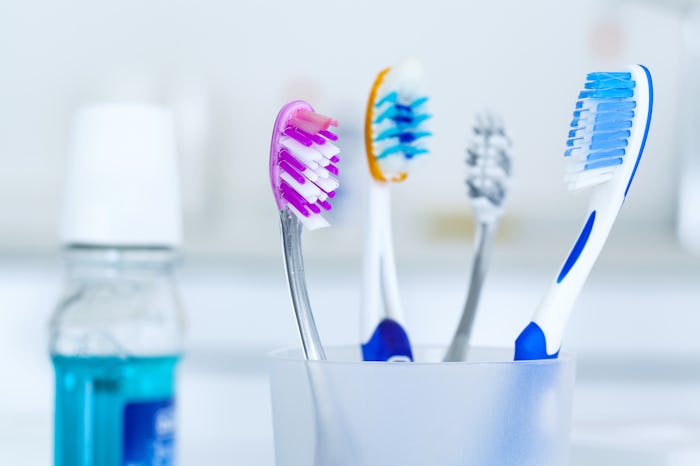Life

How To Get Rid Of Pregnancy Gingivitis, Because It's Actually Pretty Common
If you're pregnant, you're likely exhausted each night and going through your dental hygiene routine is the least of your concerns. But here's a friendly reminder to floss before you fall into bed, because it turns out keeping up with oral hygiene is crucial during pregnancy. So crucial, in fact, that you might want to schedule an appointment (or two) with your dentist — especially if your gums are already red and inflamed — and learn how to get rid of pregnancy gingivitis. It's a super common problem, but it can be avoided with proper dental hygiene.
If your gums are swollen, tender, or bleeding, you might have gingivitis, or gum disease. For this and a million other things, you can blame your pregnant hormones, which affect your tissue's response to dental plaque, according to Dr. Robert Ioppolo, an oral surgeon with Hill & Ioppolo Oral and Facial Surgeons in Lubbock, Texas. In an email to Romper, Ioppolo wrote that pregnant women have a whopping 50 to 70 percent chance of developing gingivitis during pregnancy, and if you had gingivitis beforehand, pregnancy will likely make it worse. In either case, pregnancy gingivitis isn't something you can take care of with a soft bristle brush and a little determination. Though symptoms often subside postpartum, it's important to get to the dentist before you give birth.
Gingivitis should be monitored by a dentist before and after pregnancy to prevent it from becoming irreversible periodontitis, reported Medical News Today. This more serious gum disease can lead to tooth loss, and because it's a bacterial infection, it can even lead to heart attack or stroke.
"A pregnant patient should see her dentist two to three times during the course of her pregnancy," writes Ioppolo in an email to Romper. If your gums are bothering you, make that appointment today — a deep cleaning is the best way to manage the plaque build-up. "Talk to your doctor and dentist before seeking treatment, as doctors recommend that dental treatments occur during the second trimester if possible," Ioppolo explains. If you're managing gum disease during pregnancy, treatment may require more frequent dental cleanings than if you weren't pregnant.
Obviously, no one wants gum disease, during pregnancy or at any other time, so an ounce of prevention is worth a pound of tiny toothpaste samples. Ioppolo agrees with the home care recommended by the American Pregnancy Association (APA), including brushing and flossing daily while pregnant (with emphasis on the flossing), increasing your intake of vitamin C (another reason to make that fruit smoothie), and vitamin A (just talk to your doctor about how much vitamin A is too much when you're expecting). The APA also advised gargling with sea salt to reduce inflammation, but only as an adjunct to your dental visit.
Oral and dental health matters during pregnancy, according to the Children's Dental Health Project. Prevent bacterial infections like gingivitis by scheduling a cleaning or two, and floss like you mean it. If you're already suffering from symptoms, there's no need to grin and bear it. You might wind up spending more time at the dentist than you'd like, but then again, your back probably doesn't feel amazing, and the recliner at your dentist's office is super comfortable. More importantly, a cleaning is the best way to stave off the development of a more serious infection — and more dental visits — in the future.